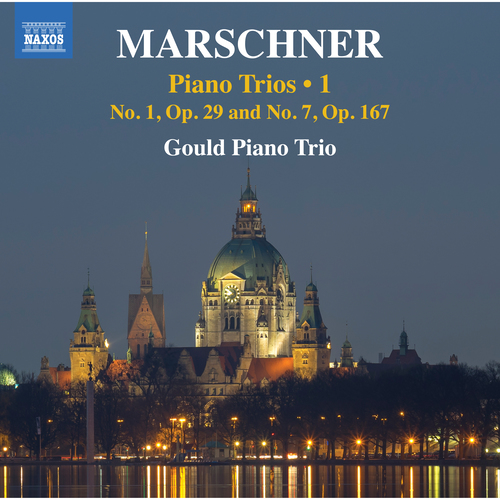…I can definitely recommend [Marschner’s piano trios] and their performances by the Gould ensemble to those chamber music mavens, like me, who are always on the lookout for previously unfamiliar Romantic-period compositions by composers that time has largely forgotten. © 2025 Fanfare Read complete review

A friend of Mendelssohn and Beethoven, competing with Weber through his operas (particularly Hans Helling and Der Vampyr), Marschner sees his notoriety eclipsed by the growing fame of Wagner. His output, besides the lieder appreciated by the Schumann couple, includes seven piano trios, of which the Goulds have undertaken a complete recording—until now, only trios No. 2 and 5 had been recorded (by the Beethoven Trio of Ravensburg under CPO). While No. 2 (1823) immediately charms with its lyrical and joyful atmosphere, the writing lacks independence between the piano and strings. Much more elaborate, No. 7 (1855) reveals the influence of Schubert—the splendid Andantino even quotes the quintet for two cellos.
The Gould Trio excels at reviving the tempered Romanticism of these two works. The care taken in this first recording leaves us hoping for a quality complete set. © 2025 Diapason
The Gould Piano Trio performs with warmth and sensitivity. Marschner’s music is expressive yet slightly reserved, and the trio plays as if engaged in conversation, at times making the music feel spontaneous. © 2025 Charlottesville Classical Read complete review
These appear to be the first high-profile recordings of this music, and the Gould Piano Trio sounds completely at home: Lucy Gould’s lithe violin tone is a constant pleasure, with Richard Lester’s cello a crucial anchoring presence. © 2025 The Strad
…they each offer sufficient interest and cleverness to warrant involved listening… I’m most grateful to the Gould Trio for their committed advocacy of these neglected, often delightful works, and I’m eagerly awaiting the next instalment. © 2025 Gramophone
The three players of the Gould Trio (Lucy Gould, violin; Richard Lester, cello; Benjamin Frith, piano) play with real assurance, but also a spark that is reminiscent of live performance…
How even are Frith’s arpeggiations; how sweet Gould’s violin sings; how eloquent Lester’s cello. Together, they offer the quintessence of chamber music.
A most rewarding disc… © 2025 Classical Explorer Read complete review

Heinrich Marschner is primarily known as a diligent opera composer who, in the period following Carl Maria von Weber, indulged not only in his penchant for gothic romantic theater materials (“The Vampire”) but also anticipated Wagner's motif of redemption (in “Hans Heiling”). In addition, Marschner composed over 400 songs and around 100 male choruses. He also created piano works and seven piano trios.
The British Gould Piano Trio has now taken on the task of recording all of these works, and it becomes immediately clear from their first album why this endeavor is well worth it. Between the first trio by the nearly 30-year-old composer from 1823 and his seventh and last, which was written more than three decades later, Marschner traveled a long way. Here, we have the early romantic playfulness of the A minor trio, and there, the emotional depths, mature composition, and heightened drama of the F major work composed at the Hanover court: The Gould Piano Trio celebrates the contrasts, performing with joy, precision, and taste. The latter is particularly important in the light-footed Op. 29, where the musicians balance the lines well; the final movement is coherently conceived and shaped by the piano. The pianist cultivates a tone that is flexible and friendly to string instruments, while the string players perform very delicately, never with an overly heavy stroke. The interplay in Op. 167 becomes not only more interesting but also highly engaging due to the independence Marschner grants to the three voices here. A true discovery! © 2024 Rondo

The Gould Piano Trio has chosen the first and last trio for the beginning of its recordings of these works. With eloquent enthusiasm and finely tuned interaction, they demonstrate the cohesion they have developed over a quarter of a century. They give the pieces recorded here exactly the right amount of conscientiousness in their performance that emphasizes the qualities and charm of the two trios, but also does not assign them unnecessary importance. © 2024 Pizzicato Read complete review
































